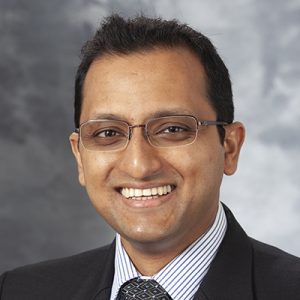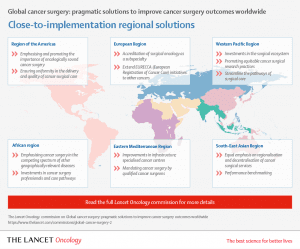
Dr. Nabeel Zafar, the Director of Global Oncology at the Carbone Cancer Center and an Assistant Professor of Surgical Oncology at UW-Madison, co-authored a recent Lancet Oncology Commission report that included more than 50 global leaders in cancer surgery. The 2023 Global Cancer Surgery Commission report titled “Pragmatic solutions to improve cancer surgery outcomes worldwide” sets out a roadmap to reduce inequities and promote safe, timely, and affordable cancer surgery for every patient.
“It was great to work on this tremendous project, which took over three years to develop,” Dr. Zafar said. “It was truly inspirational to work with other colleagues from around the world on a topic so near and dear to my interest. With the rising tide of cancer around the world, it is one thing to measure and discuss the problems, but the essential next step is what can we do about this. This report aims to outline practical solutions to a very challenging, complex and globally relevant problem.”
The new Lancet Oncology Commission is aimed at cancer surgeons as well as leaders, administrators, elected officials, and health policy advocates and builds upon the 2015 Lancet Oncology Global Cancer Commission. That report laid the foundations for a global effort to strengthen surgical services and systems, emphasizing the importance and extraordinary demand for cancer surgery alongside several insufficiencies and inequalities.
Progress in improving global cancer surgery access and delivery has been too slow to meet rising demand—the new Lancet Oncology Commission puts forward pragmatic, geographically contextualized solutions for transformative and equitable change.

While the ethical imperative for action is made throughout the paper, authors also stress the economic case for investment in cancer surgery—exclusive of other surgical treatments, provision of cancer surgery alone would avert $12.1 trillion in direct economic losses worldwide from 2015 to 2030.
“Surgery is not only one of the most cost-effective methods of treatment, but also tends to be more durable for many malignancies. Unfortunately, for most patients, particularly for those in LMICs, restricted access to safe, timely, high-quality, and affordable cancer surgical care is a harsh reality […] We hope this Commission offers the practical guidance necessary to overcome these challenges,” authors conclude.
Dr. Zafar’s work on the Commission focused on developing the cancer surgery workforce. As the global burden of cancer rises, so too does the demand for surgical providers capable of treating the disease. Eighty-two percent of countries have an inadequate number of cancer surgeons, and the majority of these are LMICs. In some countries, nine out of ten people cannot access basic surgical care.
“Increasing the cancer surgery workforce around the world is one of the most challenging aspects of improving outcomes for patients with cancer but can also be the most effective,” Dr. Zafar said. “While this requires solutions that are both creative and unique to individual countries, there are some general principles and strategies that can be universally effective. We outline these in the manuscript. With increased collaborations both within countries and across borders, the ever-growing prevalence and effectiveness of virtual platforms, and the recent increase in global efforts to ensure access to quality surgical care there are many avenues to increase the workforce.”
The complete report: “The Lancet Oncology Commission on Global Cancer Surgery: pragmatic solutions to improve cancer surgery outcomes worldwide” can be found here.